Part 16
The Changing Century, a short history by Dmitri Savostin.
Bogumil Savostin, my ancestor and author of the 14th century pamphlet, "Government and Liberty."
The years of the Renaissance between 1250 and 1350 AD were called the Changing Century by early liberal philosophers. They believed that the revolutions they'd witnessed in government, technology, and warfare would be unmatched by any other in history or futurity. Of course they were wrong. Since the Renaissance there have been greater changes: the People's Revolution, the invention of the computer, and the Great War. However, because historians are fond of anachronistic traditions, the name has remained.
In the first moments of 1250 AD, the Tsar dipped his goblet into a fountain of wine and invited his guests to drink, General Ilya Muromets sat in his bedroom in full battle dress waiting for his paranoia to manifest itself as an assassin, Viktor Vasnetsov dined with his officers and planned his next campaign against the Chinese, and a baby Boris Chicherin slept in his mother's arms; despite the continuing war against the Chinese, the movers and shakers of history lived in a empire which widely believed that the next hundred years would be similar to the last hundred.
1250s
Only a handful of people had the historical insight to forsee the coming political chaos. A modest student of Bacon, Iaropol Pavlov, wrote an book entitled, "War's Influence." It was a detailed but dry history of the post-war reconstruction in India, and though most of the work contained insignficant catalogs of statistics, family lineages, and bureacratic successions, his last chapter, "Speculation," contained this brilliant passage.
The intelligent historian cannot doubt that war is the greatest agent of change. After conquering a society as vast and culturally diverse as India, it is inevitable that the conqueror must mingle with the conquered or face the grim proposition of losing everything he has worked so hard to attain.
Here, the Denaturalist may ask, can anything stay the same? Knowing that the Tsar adopted Hinduism in order to appease his Indian subjects, I fear the answer is, "No."
If Pavlov had made the next conceptual leap, he might have predicted the consequences of the Russo-Chinese war. Instead, he died in 1253 AD in the first tuberculosis epidemic, completely unaware of his near-genius or the significance of his manner of death.
In August of 1250 AD, Lord Riv of St. Petersburg had attacked the camp of the raiding Chinese horsemen in the flood plains northwest of the city. By the time he had arrived, the Russian peasants had scattered, and the farms had been pillaged. He put most of the Chinese were put to the blade, except two sick men, which he pitied and took back with him to St. Petersburg. These unnamed Chinese soldiers, now called Patients 0a and 0b, were the first tuberculosis patients to have ever died on Russian soil. Unfortunately, they spread their malady to most of Lord Riv's court and servants, including Lord Riv himself, and within nine months, St. Petersburg was coughing blood into the streets.
It's unclear why it took so long for tuberculosis to spread from Buddhist China along the Yangtse. The two modern competing theories, "cultural walls" and "the new strain," both fail to completely account for the sudden and rapid spread of the disease. In my opinion, both theories must be combined to explain what happened: a few decades before the first epidemics, a more virulent strain must have jumped from cattle to herder and festered in the theocratic north until Mao sent his horse raiders to harrass the Russians. Since the raiders were the first regular force raised from the peasant class--the only class without any standards for health--they represented the disease's first connection to the world outside of the jungles.
Whatever the case may be, tuberculosis, known amongst the Chinese as "peasant's cough," ironically devastated the Russian middle class and the nobility. Because of their lack of immunity, the disease killed the average Russian within two to three months. Since Russian serfs wintered in isolated groups for upwards of four months, the disease could not rotate through their population faster than it killed its hosts. Only the city-dwelling merchants and nobles intermingled all year round, and only amongst them could the disease regularly find new lungs to infest.
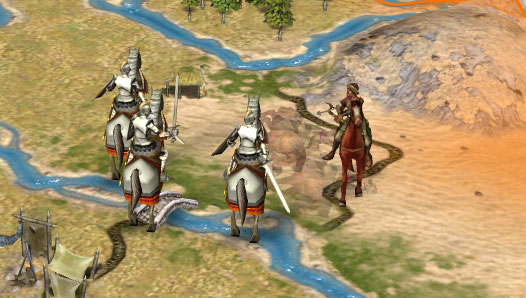
Unwittingly, Lord Riv captures more than two prisoners when he defeats the Chinese horse archers.
By isolating himself and his court, the Tsar managed to avoid becoming a victim of the epidemic, but in his isolation he ceased to deliver orders to his generals. Before the decade was out, many of them grew restless, and eventually two of his hand-picked followers struck out on their own, the crown be damned. Similarly, many dukedoms declared the crown to be incompetent and redoubled their efforts to assert local authority over their lands.
Most promiment was the example of Sviatoslav Igorevich, Duke of Crimea. His lands shared a western border with Spain, and following the Tsar's devestating rebuke of the Spanish Queen's demands, Spain had been siphoning Chinese troops from the mountain-village of Saxon, through the forests near Barcelona, and into the Crimean mines along the border. After three years of pleading with the Tsar to respond in force, he took matters into his own hands. He recruited several hundred macemen to search the western frontier and caught the Chinese raiders in a camp near an iron deposit. Two Spanish advisors were caught amongst the Chinese, and though one committed suicide, the other was captured, carefully pulled to pieces, and sent to Barcelona in three Chinese wagons. The message was clear: even if the Tsar has vanished, the Russian people will not allow the Spanish to interfere.
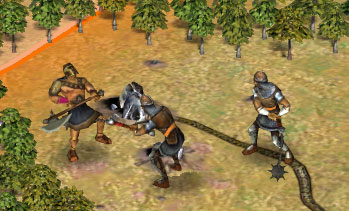
Near the border, Russian macemen devestate the ill-equipped Chinese bandits.
Similarly, in 1257, General Ilya Muromets decided--for some wrong reasons and some right reasons--that it would be best if he left Beijing. He rounded up all the soldiers in the city except for a skeleton crew of longbowmen and had them set camp in the hinterlands. He wrote in his journal that, "No bodyguard will suffice to protect me from Chinese assassins, but I can increase my chances of survival by living at all times in the sole company of Russian and Indian soldiers." Since he knew the Tsar was out of contact and would not pay to maintain a standing army outside of the city, he spent a year whipping them into fighting shape, and then started the march north towards Nanjing. If he could not afford to pay for his soldiers, then he would let them pillage the Chinese countryside for riches and resources.
1260s
Viktor Vasnetsov had never paused in his war plans. After conquering Guangzhou, he had studied the results of the battle and reorganized his army to take advantage of the mobility of his knights. A scouting force was sent north to the city of Xian in the Yangtse Jungle, where they discovered that the Chinese defended the wallless city with only minor siegeworks and a skeleton crew of pikes and longbowmen. Though the pikes could form a battlefield strongpoint for the Chinese forces, Viktor knew that he had the numerical advantage and would be capable of flanking even the most tightly packed pike regiment. He prepared his initial battle plan, passed it by his officers, and then sailed a force of 400 knights and 800 macemen up the Yangtse. In 1261 AD, they landed south of the city and laid siege to the defenders while waiting for the supply trains to establish themselves across the plains. Two runs of catapults were dragged up from Guangzhou to break the siegeworks, and the struggle for Xian began.
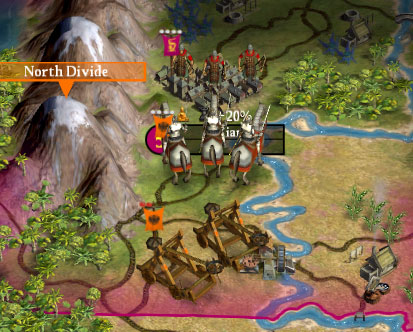
The North Divide acted as a catch for moisture floating in from the equatorial sea. Constant rains made the marshy grasslands difficult to navigate for the engineers bringing the catapults from Guangzhou. However, this weather made Xian an excellent region for growing perrenial dye-plants, and a valuable economic resource for the empire. In Viktor's mind, it was worth the struggle.
During this decade, Ilya Muromets's forces slowly advanced through the rainforests south of Nanjing. Muromets wrote in his journal:
"Bananas, bananas, bananas. My bowels have been scoured by the flesh of this fruit, and I daily check my runny stool for blood. Do the peasants eat anything but bananas and rice? If so, this explains the weak character of the Chinese. Only a fruit-munching coward would send an assassin when he could fight in battle.
I have sent my men to kill a monkey for me to eat. I need its heart to calm my chest and its gall bladder to relieve these headaches."

A modern image of the banana plantation where Ilya Muromets camped in 1267.
In 1263 AD, Boris Chicherin joined the Great Library at Moscow as a student of Denaturalist thinker Pilof Prach. Prach was a terrible philosopher and a worse teacher, but his patronage was appreciated by Chicherin, who spent most of his time arguing with the established Denaturation philosophers and the diminishing school of Inevitabilism. He was considered a hopeless upstart by most of the old guard, but a group of Inevitabilists known as the "Cynical Six" wrote in their essay "Meta-inevitabilism:"
Even a philosophy follows the form of the Aging, and as proof of itself, Inevitabilism grows old and now faces destruction at the young hands of Boris Chicherin. Though our Denaturalist friends mock the boy's egotism, his perfect memory and boldness of thought are an unmatched wellspring of philisophical imagination. Because we are the enlightened leaders of Inevitabilism, we know that it is best to smoothly transition unto obsolescence, and we can think of no better way except to throw our lot in with Chicherin and join in his study of liberty.
And so, meta-inevitabilism ends as the philosophy undoes itself.
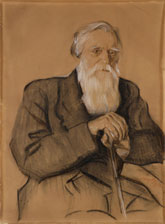
Boris Chicherin in his late age.
1270s
By 1271, the Tsar's court had become a stifling noose of political intrigue. The Tsar's isolation had turned into two decades of hypochondria, and now anyone with the guts to sneak messages out of the palace and into the streets could gain extreme political power. Viktor Vasnetsov's father, Count Vasnetsov, was one of the first to make regular contact with the outside world, and by 1270, he had almost the entire Moscovian judicial system in his pocket. The rest of the court was pooling their resources against him, while everyone involved was attempting to keep the struggle under the radar of the Tsar. On the Tsar's orders, anyone who had any kind of contact with the outside world would be executed as a "plague risk."
Count Vasnetsov was not a fool. He used his judicial power to selectively back loyal crime rings and assassins, and by 1275, most of the servants and trustees of the estates of his rivals were dead or fleeing Moscow. Once their property was sufficiently abandoned, he burgled it and collected it in his Crimean estates. By 1279, he was poised to steal or buy Moscow without ever alerting the Tsar.
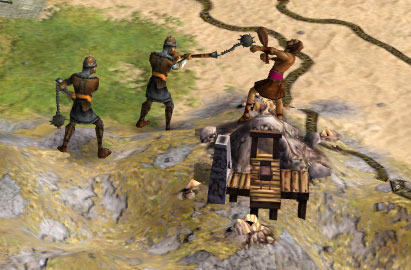
Back in Crimea, Duke Igorevich defended his gold deposits from the last of the Chinese raiders. This particular battle was horribly one-sided: all ninety-two Chinese died without wounding a single Russian maceman.
The Count's son, Viktor Vasnetsov, assaulted Xian in the same year. Despite a lengthy siege, the Catapults from Guangzhou were perpetually mired in the southern marshes and unavailable. Impatient and feeling the first signs of middle age, he decided to assault the thinly defended city whether or not he had artillery support. Starting in the late winter, two hundred macemen were drafted into the engineer corps and directed to dig tunnels capable of bypassing the city's southern siegeworks. General Vasnetsov knew that these tunnels would not go unnoticed by the Chinese engineers, but he believed that once they were in place, it would be impossible to prevent the Russian's overwhelming numbers from breaking through into the city.
In a series of secret meetings, Vasnetsov's lead engineer expressed his concerns. He believed that the soft soil, while fine for tunneling, would be easy to collapse with only a handful of Chinese sapping teams. Viktor insisted that the digging continue, expressing the hope that, "Though the Chinese will collapse the tunnel and bury some of my men, the rest will march through the ditch."
In the late summer, General Vasnetsov ordered two hundred of his macemen into the tunnels, and the assault began. The sound of the soldiers stamping through the tunnels was obvious--from a few yards their maces could be heard clinking against their chains, like a metal river roaring beneath the earth. The Chinese response was swift. Chinese engineers had dug tiny sapping tunnels beneath key supports every fifty yards along the Russian's larger tunnel, and in short order they set about collapsing the ground onto the macemen.
It was then, however, that the brilliance of the Russian engineers became obvious. Though the tunnel collapsed, it was designed to collapse in a controlled manner. A vast majority of the dirt was directed towards the sides of the tunnels by long folding lattices of wood. Several extra feet of space had been excavated the sides of the tunnel, and most of the dirt piled up there. Of course, no collapse was perfect, and the last one hundred meters of the tunnel came down without any control. About thirty of the macemen were crushed or buried alive, but the rest were simply swamped in a knee deep pile of topsoil.
Because the Chinese had expected a fatal collapse, their longbowmen had withdrawn to the outer districts of Xian, leaving almost no defenders at the siegeworks. The Russian macemen marched up to the end of the ditch and threw down ladders onto the dirt, forming ramps for the men to ascend to the far side of the defenses. The Chinese commander attempted to do the right thing at the wrong time, and sent his longbowmen out from the city in order to shoot the Russians while they were pinned in the ditch, but he was too late. As the longbowmen reached the halfway point between the city and the collapsed tunnel, the Russians emerged in number and deployed along a full line. Several intelligent Chinese Seargents immediately ordered a retreat to the city, but the vast majority followed their commander's orders and continued to approach the ditch. Vasnetsov's Lieutenant, Lord Kavkaz, wrote in his journal concerning the battle, "It was too easy. The Chinese closed range without firing a shot. Some of the soldiers were laughing. Nobody believed that our enemies were walking into close combat with longbows."
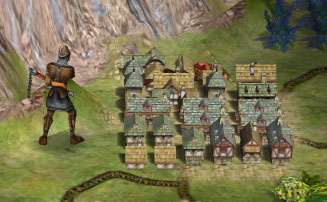
"But they were, and we won." -- Lord Kavkaz, journal entry August 7th, 1279.
The rest of Vasnetsov's macemen marched up the ditch and into the city. Xian's pikemen were well-equipped for defending against a calvary charge, but the smaller macemen were capable of slipping through the pikes and into hand to hand combat, which deeply favored the mace. The Chinese were butchered.
Unfortunately for the villagers of Xian, their governor committed suicide after losing the battle. Vasnetsov was denied a proper surrender, and he furiously ordered his soldiers to "ruin the village and its people." Before autumn came, they pillaged every ounce of food and valuables, and if there had been anywhere else to go, Xian would have been abandoned.
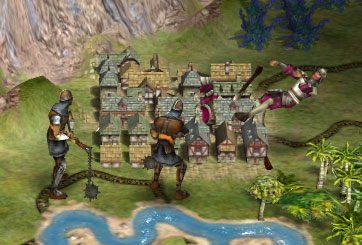
The pikes were easily defeated by Russian maces.
Though Xian was a minor city, it sat upon the largest highway running through the Yangtse Jungle. To the west was Saxon, the conquered barbarian village, and to the east was Parthian, Mao's capital, and Nanjing, Ilya Muromets's target. From his current position, Vasnetsov could march to any corner of the Chinese empire. Eventually, he chose to support Muromets's campaign in the East, hoping that the Saxon village in the west would wither and fall to the Crimeans. To ensure that action was taken in the west, a message was sent to Crimea, and then Vasnetsov left for his final campaign.
During this decade, Boris Chicherin managed to hash out the fundamental tenet of his theory of liberty: the state existed to protect the liberty of the individual and the individual's property. But the framework for his philosophy was incomplete. He had no justification for his beliefs, and the Denaturalists were quick to dismiss him for that reason. But on the feast of the winter solstice (December 22nd, 1279), he met a Taoist priest by the name Protas, and things fell into place.
1280s
In military terms, the 1280s was a decade of movement and reinforcement. Muromets was afraid to directly assault or even siege Nanjing with only a force of elephants to hold the line, and so he spent most of the decade pillaging the hinterlands and moving generally northwest, towards Nanjing's mines and the source of Chinese iron. Vasnetsov marched out of Xian and into the jungle southeast of Parthian, scouting but not sieging the Imperial Capital and hoping to meet with Muromets before the campaign was over.
Back in Moscow, however, the 1280s was a time of chaos. In 1282, Count Vasnetsov finally died, not from a disease or a blade, but from old age. His son, Viktor Vasnetsov, legally became the new head of his financial empire, but because the Count was locked away inside the palace with the Tsar, news of his death never reached Viktor. The effects of his death, however, were felt widely. The Count's street level managers were vicious people with large lines of credit and a sense for weakness. The moment the commands from the Count ceased to come, they stole their share of the wealth, drew whatever they could from the Count's estate, and declared war on one another. Moscow was drawn into fifteen splintered districts, each centered around a valuable building or marketplace, and guards were placed along the borders. If you didn't pay, you couldn't travel from one district to another. Intracity commerce died a quick, violent death, and debt collectors feasted upon the financial corpse. Over twenty percent of the Moscovian population was driven into the streets, and slums popped up along the roads out of the city. Anyone who could afford to flee to the stable duchies of St. Petersburg or Grozny left, further depressing the wealth and vitality of the capital.
Into this enviroment grew the political philosophy of Boris Chicherin. He wrote, "In rotten times, we often forget that the most beautiful crops grow in rotten things."
But let us backtrack for a moment. In 1280, Boris and Protas locked themselves in a room in the west wing of the Great Library at Moscow and began to formulate the Taoist basis for human rights. Their ultimate logic was simple: every man carries within him a dual aspect of the Tao--a fate for things he deserves, and a fate against those things he does not deserve. The things a man deserves may change depending upon his actions, and the only way mankind may determine what a man deserves is through the creation of morals and laws. On the other side of the Tao, the things a man does not deserve are unchanging: he does not deserve to die, he does not deserve to have his property taken from him, he does not deserve to be silenced, he does not deserve to be denied his religion, he does not deserve the cruelty of his oppressors, and he does not deserve to be punished for things he has not done. In short, man deserves the consequences of his actions, but he does not deserve the oppression of an uncaring or exploitative government.
"If you study the Tao," wrote Boris, "then you cannot deny those things that man does not deserve. My philisophical foes, my hecklers, would not wish themselves these terrible fates; yet they routinely support a blind government which lets thugs rule our streets. Citizens are being silenced, their religion is being denied under this Hindu theocracy, their liberty is being quashed by criminals: all of this tyranny must end."
With the religious support of Protas and financial backing of the former-Inevitabilists, Boris began making public speeches. His most famous speech, and the only one with a recorded transcript, was the Address to the University Forum. Over two-hundred thousand devout Taoists attended, and nineteen criers were required to relay the speech to the entire crowd.
His most famous passage, still quoted today, was this:
"Taoism is a religion of freedom. Taoists understand liberty and reject the stern moralities of Hinduism, Judaism, Christianity and Confucianism. Taoists reject religious authority because they know. They know it oppresses the heart and the soul and chains us to this world. They know we cannot reach heaven while tied to tyrants. They know what it means to be an individual.
Taoists, friends, countrymen, lend me your ears. Like the soul, a brilliant idea should not be chained to a single religion. Let freedom and liberty become the philosophies of life. See that other paths exist. We shouldn't live under the thumb of a blind and deaf monarchy. We can do better. We can rule ourselves.
We can overthrow the Tsar!"
The liberal revolution had begun.
1290s
The 1290s began with the conquest of Chengdu. Svyatogor had reported the foundation of this city long before the Changing Century began, and in the last 70 years, it had grown surprisingly well, despite the rugged conditions north of the Gobi Desert.
The Russian response came in the form of Lord Khaabko's last battle before retirement. With a force of 200 knights, he carved out a tiny duchy of his own by conquering Chengdu. The battle itself was of little tactical merit, as Chengdu's backwater military forces were incapable of mounting a proper defense.
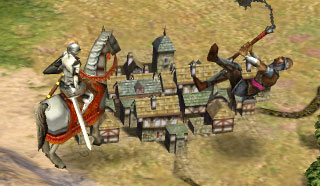
Lord Khaabko conquered Chengdu and founded a remote Grand Duchy.
Militarily, the 1290s was a silent turning point. Muromets moved into the mines around Nanjing and pillaged them with no resistance from the Chinese. Unlike Svyatogor's small cadre of knights, Muromets's large force of healthy elephants and macemen was too large to counterattack. Without much flash or pomp, the Chinese war machine sputtered and died. In the same decade, Vasnetsov moved his soldiers into the region south of Parthian and set siege to the city.
Back in Moscow, however, many things happened at once.
Boris Chicherin became the mouthpiece for a general revolt. Starting in the spring of 1291, he stood and delivered his Forum Address while a crowd of Taoist revolutionaries lynched the leaders of a criminal ring in the University District. While pleading for his life, one of the ringleaders claimed that he was "merely a pawn for an official of the Tsar's court," a mistake which lead to his gruesome death and fresh interest in the revolution. The ringleader's limbs, which had been pulled from his living body by the hands of five men, were thrown through the windows of the Tsar's palace while the royal guard watched impassively--or joined in the riot.
After forty years, the tuberculosis epidemic had mutated to a less virulent form, which only became symptomatic in about five percent of infections. Fatalities had dropped precipitously, and anyone reasonable would have come out of hiding and rejoined society. The Tsar had not. Instead, he had descended into a terrible state of paranoia, and now that he was eighty-nine, he was mad with senility. When the windows of the palace came crashing down around him, he picked up one of the limbs and started beating on a painting of himself as a young man.
The riots lasted for two weeks, as Boris and Protas went around the city and convinced the populace to join them in the liberal revolution. Local courthouses were put to the flame, and anyone identified as a member of Count Vasnetsov's old power structure was executed by angry Taoists. The Tsar's palace was irregularly targeted by the mobs, but it wasn't until Boris came to the gates that an organized attempt was made on the Tsar.
Incapable of facing down a general revolt, the palace guards surrendered to Boris shortly after his arrival. Intelligently, they knew that if they let things go smoothly, the entire exchange of power might happen without any further blood.
Boris and Protas entered the palace and with a cadre of loyalists, they captured the Tsar in his bedroom. Unlike Godse of India, however, Boris didn't understand that an ousted leader has to die immediately, lest he linger and influence the next government. Boris and Protas pitied the senile Tsar, and rather than execute him, they kept him in his room for a week while Boris calmed the crowds and searched through the Tsar's court for someone capable of running the government until a liberal system could be established.
The man Boris chose was Ilyvich Prostov Lenin, a Taoist Count from Grozny with years of experience managing the political affairs of the Grandy Duchy of the Gaafas. Prostov Lenin was a keen man, and he saw that for all the philosopher's brilliance, Boris Chicherin was politically inept. After only three hours, he managed to convince Boris that a hybrid government was best: the monarchic structure of society would be maintained and run by Prostov Lenin, while a parlaiment headed by Boris would work on drafting a constitution for a liberal government. Accordingly, the monarchy would--on paper--have very little power. In truth, however, Lenin knew that until the parlaiment produced a viable system of government, the monarchy would retain its strength.
For the rest of the decade, Boris worked on assembling philosophers into an assembly at the Great Library. This enlightened parlaiment, he believed, would eventually craft the perfect liberal constitution. In the meantime, Prostov Lenin passed several reforms that appeased the revolutionaries. The most important two are: he executed the entire court of the Tsar and siezed their assets for the government; and he declared the state religion to be Taoism. Criminal power diminished almost instantly, and the people of Moscow felt that they had been recognized by their state.
If only they had known how deeply this would offend the Hindus, they might have avoided the terrible revolutions of the centuries to come. But that's for another history.
Wait, the post is ending there? What about the 1300s and on, Zooloo?
They will come in another update. I've written much of it, but I think this post is too long already, so I'm cutting it off here and saving the rest for later.
Let me explain how the next few updates will come.
Because of the detail, I'm going to work the next two updates in this manner: the next update will cover the final third part of the Russo-Chinese war. It will completely ignore the technological and social aspects of the Empire. The update after that will finish the second part (1300 to 1350) of the Changing Century, which will cover only the technological and social aspects of the Empire.
Why split it up like this? Because this post is getting REALLY long, and I need to divide things up or it'll get hard to follow.
Edit: I'm also sorry that I have no good images for the revolution. :[ I hope this post doesn't read like one big slow block of text.